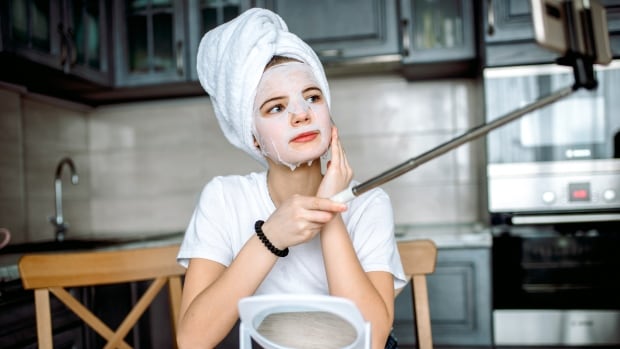Since when did telling tweens what they can and can’t do work out, anyway?
A California bill that aimed to ban selling certain anti-aging skin-care products to children under age 13 failed to move forward last week, ending Democratic Assemblymember Alex Lee’s attempt to combat the so-called Sephora kids trend.
The trend, where kids as young as eight or nine use anti-aging skin-care products purchased from beauty retailers such as Sephora, has been dividing parents, dermatologists, retailers and social media.
Millions of people have watched and shared videos condemning it, and dermatologists have warned that some of these products aren’t meant for pediatric skin. But with the bill’s failure, and Generation Alpha continuing to drive skin-care sales in North America, some youth and media experts say a product ban was never the answer.
Not when there are 11.9 million “get ready with me” videos on TikTok, and Gen Alpha influencers showing off their skin-care routines and “hauls” on videos with millions of views and comments.
Meanwhile, the global beauty industry made $430 billion US in revenue in 2022, with skin care making up the lion’s share, according to a 2023 report by consulting firm McKinsey & Company.
The real issue is capitalism, and the drive to get kids to consume as much as possible, said Shauna Pomerantz, a professor of child and youth studies at Brock University. And the more beauty trends that exist on social media, the more kids will buy, she added.
“Kids will simply find other ways to get it,” Pomerantz told CBC News.
Social media is abuzz about the number of tweens obsessed with makeup and skin care in a trend dubbed ‘Sephora Kids.’ CBC’s Anya Zoledziowski explains how they’re getting hooked and why experts have mixed opinions on whether we should be worried about it.
The products aren’t the problem: industry group
Shana MacDonald, an associate professor in communication arts at the University of Waterloo, says the problem lies more with social media.
“Young girls have always been interested in skin care and in makeup products. It’s just that at this current moment, that’s being furthered by the social media machine — that means the stakes are higher,” MacDonald said.
California’s Bill AB 2491 would have banned the sale of over-the-counter skin-care or cosmetic products to kids under age 13 that contain either Vitamin A and its derivatives (such as retinoids and retinol), or an alpha hydroxy acid, including glycolic acid, ascorbic acid (vitamin C) or citric acid.
These ingredients, which can boost cell turnover and help reduce fine lines, can also irritate skin, causing redness, itching and dryness, and potentially lead to topical dermatitis and eczema, according to a news release about the bill from Lee’s office. Children also have more sensitive skin than adults, it noted.
The risk is sensitization, meaning development of allergic contact dermatitis, to specific ingredients in these products, pediatric dermatologist Dr. Michele Ramien, the president of the Canadian Dermatology Association, told CBC News.
“Many are highly fragranced and/or have many ingredients, so especially for tweens and teens with eczema or sensitive skin, this risk of this type of skin allergy is real,” Ramien said.
The problem is that social media pressures kids to use the the products inappropriately, the Personal Care Products Council (PCPC) said in a news release at the end of April.
The PCPC is a U.S. national trade association representing over 600 companies — including Sephora’s parent company, LVMH.
“Every ingredient targeted by this bill is safe when used as directed at the appropriate age,” it said.
“Trends come and go … but the underlying motivation for following trends remain largely the same,” said Michelle Chen, assistant professor in the communication, pop culture and film department, also at Brock University.
“People follow trends because of their desire for social validation by their peers.”
Tweens are especially susceptible because they’re starting to carve out their identity, she said.
And while there is a trend toward selling skin-care products to boys, it’s mostly girls and women targeted by the beauty industry, where there’s a “hyper-sexist culture and gender double standard,” Pomerantz said.
Gen Alpha driving beauty sales, and some brands are on board
Canadian beauty industry sales rose 18 per cent in the first nine months of 2023, according to global analytics firm Circana. And the firm said Gen Alpha will likely drive growth for “years to come.”
“Social media content no doubt sways Gen Alpha,” said beauty director and industry analyst Jennifer Famiano in a May 14 post.
“It’s a game in which the consumer is looking purely at aesthetics, with the measure of success being an enviable ‘shelfie’ for their ‘get ready with me’ video showing off their collection.”

Others have argued that brands like Drunk Elephant, considered a status symbol among tweens, aren’t helping, with their colourful packaging and cute names, like the “Itty Bitty Midi Committee Acid Kit.”
In a social media post last December, Drunk Elephant offered up a list of product recommendations for children, including a $92 bottle of Virgin Marula Luxury Face Oil. The product says it treats issues like fine lines and uneven texture.
“None of this is appropriate for children,” a user wrote in the comments, one of many.
Drunk Elephant makes products for all ages, and everyone just needs to be clear on which products are appropriate for whom, founder Tiffany Masterson said in an Instagram video in December.
“It’s great because … they’re learning how to take care of their skin. My guess is their skin is going to look better than a lot of other people’s skin,” she said in the video.
Drunk Elephant is marketing directly to a younger demographic, Pomerantz said, getting children and parents to fork over “enormous amounts of money for the privilege of the brand.”
“This brand, more than any other, has made skin care a thing for kids,” she said.
Most tweens and teens only need to wash their faces twice a day and use moisturizer if your skin is dry, Ramien, the dermatologist, explained. She recommends using a gentle non-soap cleanser like Dove, and a Cetaphil or Cerave moisturizer.
And always use an SPF, she added.
Spending too much time on social media erodes girls’ mental health with negative impacts on learning, warns a new UNESCO report that also found girls are more susceptible than boys to negative feelings about appearance and body image.
So what’s the answer?
Kids have followed trends to gain acceptance from their peers long before social media, Chen points out.
After all, in the 1990s, kids exfoliated layers of skin off their faces with apricot scrubs and smeared themselves with benzoyl peroxide zit creams so strong they bleached their pillowcases.
The difference is that social media creates more pressure, Chen said, where interactions are a form of social currency.
Meanwhile, influencer culture has normalized using luxury products, like hundred-dollar skin creams, MacDonald said. So some of the responsibility lies with families to have conversations with kids about what’s appropriate for young skin, and being able to recognize that a lot of what they see online is marketing.
But the onus is also on the skin-care industry itself, Pomerantz said.
“For as long as marketers have preyed on the insecurities of girls and women, they have purchased beauty products,” she said.
“The skin-care industry should take greater responsibility to ensure their products are not marketed in a way that signals they are for kids.”
In the meantime, Gen Alpha influencers continue to build followings online with their hauls and routines.
“Sephora haul!” says a child who pronounces it “Sephowa” in a video with 1.2 million views, before dabbing a night cream containing alpha hydroxy acids — meant for smoothing fine lines — on her cheeks and forehead.
A call to the Happiness Hotline helps Janaye figure out how to use social media to make her feel good about herself. And how to avoid space wedgies.




